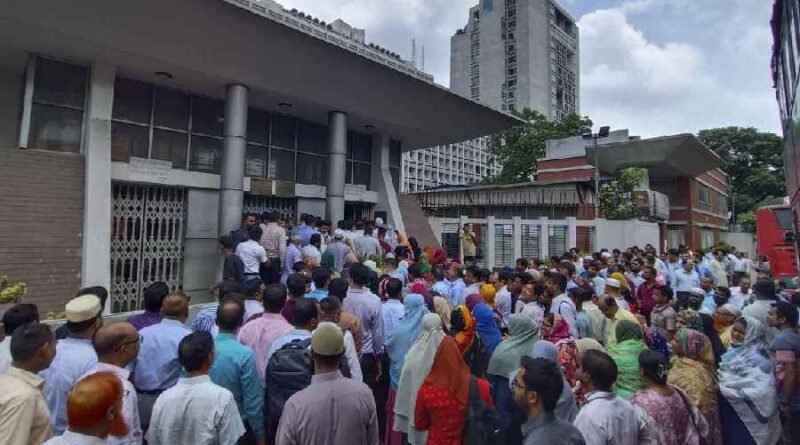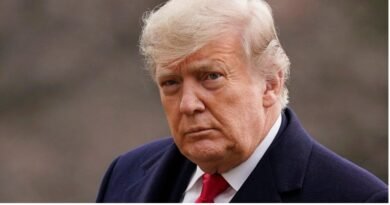‘Situation heading towards normal’: Bangladesh government lifts curfew for seven hours in Dhaka
The last week, Bangladesh witnessed unprecedented violence as a peaceful protest by students, who were demanding reforms in reservation in government jobs, snowballed into a rebellion against the government and resulted in clashes between the protesters and law enforcing agencies across the country
Calcutta, July 25, dmanewsdesk: The usual scenes of long traffic snarls were back on Dhaka streets almost after a week today as the curfew, imposed last Friday night in the wake of violence over quota reform protests, was relaxed in the capital for seven hours and private and government offices, including banks, were thrown open for a limited period.
Long queues were seen outside banks as ordinary citizens, who could not use ATMs or online banking facilities due to the Internet shutdown for the last six days, rushed to the branches to withdraw money.
Amid growing demand for the resumption of Internet and broadband services — the country has over 12.7 crore connections — from users, Zunaid Ahmed Palak, state minister for posts, telecommunications and information technology, said during a news conference that households will get broadband Internet services by Wednesday night. Mobile Internet services could be restored fully by Monday night, he said, after holding a meeting with Internet service providers.
“Gradually, the situation is moving towards normal… But the government is not complacent and is constantly assessing the ground situation and taking steps accordingly. The offices were allowed to be opened for a limited period today and the duration will be extended depending on the situation,” Nayeemul Islam Khan, press secretary to Prime Minister Sheikh Hasina told this newspaper on Wednesday evening.
The last week witnessed unprecedented violence in Bangladesh as a peaceful protest by students, who were demanding reforms in reservation in government jobs, snowballed into a rebellion against the government and resulted in clashes between the protesters and law enforcing agencies in different parts of the country.
The clashes — described by some sections in the media as the “deadliest” since the Liberation War of 1971 — drew global attention amid reports that at least 175 people were killed over a week. In the absence of any communication from the government on the death toll, there has been a lot of speculation about the number of casualties. Khan said that the data on deaths was still being collated, before adding that the vested interest groups had been inflating the numbers to show the government in poor light.
After accusing Opposition forces like the BNP and the Jamaat-e-Islami for the violence and the large-scale vandalism of public and private property, the Hasina government imposed a nationwide curfew and deployed the armed forces last Friday to restore peace and order. The decision, to a great extent, aided the process of return to normalcy, following which curfew was relaxed for seven hours on Wednesday.
Bangladesh home minister Asaduzzaman Khan today said the government is working to lift the curfew as soon as possible.
“We have been forced to impose a curfew. We called the army … they are cooperating. We have already controlled the emergence of militants and terrorists, the conspiracies of BNP-Jamaat. Hopefully, in the next two to four days, everything will be under control,” the minister was quoted in The Daily Star, a leading English daily in Bangladesh.
“The curfew will be lifted, and normal life will resume. We are working to arrange it as soon as we can,” he added.
Along with its efforts to fastrack return to normalcy, the Bangladesh government has also launched a two-pronged attack on those behind the violence during the student protests.
The first offensive is in the form of an all-out information war against Hasina’s destractors, who had accused her of using force to neutralise a “peaceful student movement” and held her responsible for the bloodshed. After releasing a compilation of properties vandalised or set on fire by the miscreants among the porotestors and a detailed note on how the government was sympathetic to the protestors, various wings of the government have been releasing short videos to establish how rogue elements infiltrated the ranks of protesting students.
Hasina herself met senior journalists and editors at her office and accused the BNP and the Jmaat-e-Islami of hatching a conspiracy to create disturbance to cripple the economy.
“They (BNP-Jamaat) tried to prevent us from holding the national election (in January 2024), but we held it. Then they thought the election would not be accepted by all, but it was accepted. Finally, we formed the government. But I had an apprehension that there would be a strike like this,” she said.
“It was a target to destroy the country’s economy… It was a little bit understandable that there was a grave conspiracy,” she added at the meeting, organised by the Editors’ Guild, held this evening.
On the ground, the law enforcing agencies have launched a massive crackdown and have rounded up over 1,700 people from Dhaka and neighbouring areas for their role in killings and vandalism.
“The government is arresting the criminals, who created all the problems by taking over the control of the protests from the students. Here I must mention that special efforts are made not to harass innocent students,” said the press secretary.
“It has now been established beyond doubt that the opposition forces had gathered miscreants from across the country to Dhaka with a sinister plan… The law enforcers are now conducting raids and arresting them. The government believes that all these measures are needed to ensure the return of peace and order,” he summed up.
Source: The Telegraph online




